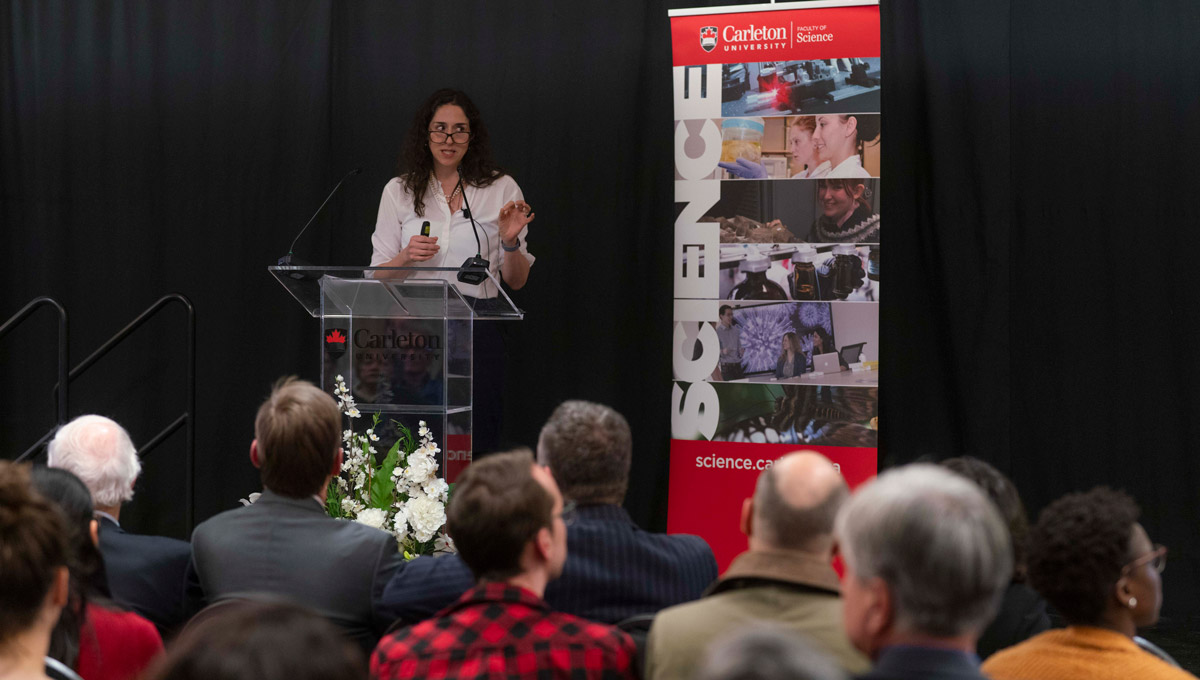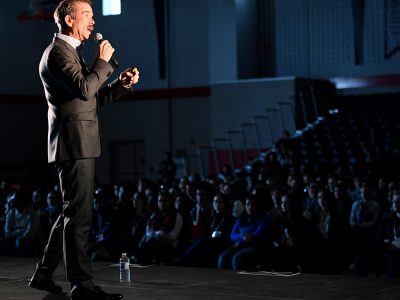By Elizabeth Howell
Photos by Chris Roussakis
Medicine is more complicated than ever these days, with questions about data privacy and targeting illness using your individual genome – but it’s not the first time the health system faced rapid change.
Nearly a century ago, a doctor named Joseph Finer saw his medicine bag quickly transform with the additions of insulin and, most likely, aspirin. His daughter June learned about how health care divides along class lines as she treated injuries on the front lines of the U.S. civil rights movement.
Natasha Loder, The Economist‘s health policy editor, chose these doctors for two reasons – because they illustrate trends in medicine, for one, but also because they happen to be her own family members and she found their stories compelling.

Natasha Loder
Joseph Finer was her grandfather, and June Finer her aunt. “My message from my family to yours is that our priorities in the future of medicine are in all of our hands,” said Loder, as she delivered an address on how medicine is changing at the annual Discovery Lecture on Feb. 4, 2019.
How Health and Medicine are Changing
Some of that change is unequivocally good, she said. Universal health care is a priority now for many countries around the world, most recently nations such as China and India. About 40 per cent of countries worldwide have universal health care, she said, calling it an “important trend” because it creates a demand for medicine, hospitals and health-care workers.
Other trends have mixed results, such as how insurance providers and doctors are eager to collect personal information. This information could improve lifespan and patient outcomes through targeted drugs, digital therapeutics and a phenomenon called polygenic scoring – a genetic assessment to determine risk factors for certain diseases or conditions.
Such measures are not perfect, however, particularly because many health conditions are a result of income disparity, Loder said; patients may have little time to exercise because they work long hours, for example. “I don’t think that’s something any society is ready to essentially deal with.”
So much data is generated from this revolution of information that only artificial intelligence can sort it out. While AI often makes decisions that are hard for humans to understand, and there are privacy issues associated with collecting the data, Loder said improving medicine will require us to embrace AI. There is just too much data for humans to process.
“If you think about it, with that kind of information you can take a population of people and you can find out who is most at risk and least at risk,” she said.
Being Mindful About Medicine Market Failures
But Loder said the industry has to be mindful of medicine market failures. The World Health Organization, for example, is concerned about “Disease X” – an unknown disease that may be a threat to humans that we do not even know about.
“The private sector is not going to do this [research]. We have to as a society,” she warned.
Loder, who has spent 18 years at The Economist, said after the lecture that one of the things that surprises her most today is the cost of medicine. Indeed, during the lecture she showed that several countries, including Canada, are spending more on health care as a percentage of GDP compared to a few years ago. What is worrisome is that in some cases, such as the United States, high spending is not co-related with longer lifespans.
The Discovery Lecture is designed to showcase and promote excellence in science journalism. The lecture is sponsored jointly by the Faculty of Science and the School of Journalism and Communcation.
This year’s lecture on medicine links with multiple Carleton initiatives. Carleton is creating a concentration in Health Sciences for undergraduate students and incorporating communication into all programs in science – both undergraduate and graduate. The Faculty of Science is also creating a bachelor of Interdisciplinary Science and Practice this fall.
Friday, February 15, 2019 in Faculty of Science, Journalism and Communication
Share: Twitter, Facebook



